Principles of Liberty: Ten Biblical Truths Embedded in the Declaration of Independence
A Five-Session Bible Study
Teaching Plan for Session 4
God Determines Rights and Gives Government the Job of Protecting Them
In this series of Bible studies, we are exploring ten Christian elements in the Declaration of Independence, ten ideals that are thoroughly biblical but not always recognized as such in our day. In fact, modern non-Christian influences have so redefined and reinterpreted words and concepts that in some cases, contemporary Americans completely misunderstand what the Founders intended. A Word Foundations article titled “Principles of Liberty” is foundational to this series.

A PDF file of the above graphic is available here. A Bible study series overview is available here.
It’s high time we rediscover the true meaning of these principles and that we contend anew for them as the Founders understood them. In our study, we are highlighting words and phrases from the most quoted portion of the Declaration, then we’re demonstrating how they’re linked to Scripture and to biblical truth. In each session we’re considering two principles.
Here are the principles we are examining in Session 4.
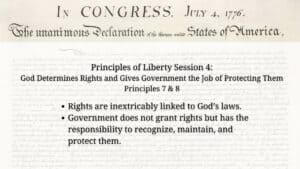
A PDF file of this slide is available here.
- Read the background information for the session. Be aware it likely provides a good bit more information than you will use in the time allotted for the Bible study. Also, understand that here, in the teaching plan for Session 4, we will provide some material not included in the background information.
- Session Alert! Item 19 introduces and item 20 highlights a contemporary example of attempts on the part of government to circumvent unalienable rights. These items are helpful to the discussion, but you may need to omit them due to time constraints. If you decide to use item 20, review, or ask a participant you enlist in advance to review, this summary of a series of events taking place in California and the United States in late May and early June, 2020. The willing individual, whether that person is you or someone else, will give a brief presentation to the large group summarizing the details of the events described. The summary also is available online here.
 Direct participants’ attention to this important quote from Thomas Jefferson, third president of the United States and principle author of the Declaration of Independence: “A free people [claim] their rights as derived from the laws of nature, and not as the gift of their chief magistrate.” We know that Jefferson didn’t consider nature itself to be God, or a god, because in his original draft of the Declaration, he wrote of “the laws of nature & of nature’s god.” A PDF file of the accompanying graphic is available here.
Direct participants’ attention to this important quote from Thomas Jefferson, third president of the United States and principle author of the Declaration of Independence: “A free people [claim] their rights as derived from the laws of nature, and not as the gift of their chief magistrate.” We know that Jefferson didn’t consider nature itself to be God, or a god, because in his original draft of the Declaration, he wrote of “the laws of nature & of nature’s god.” A PDF file of the accompanying graphic is available here.- Items 4-7 will help you review important material covered previously. Say: In previous sessions, we have seen that rights as viewed by America’s Founders were not “rights” created or fashioned by government, but inherent rights that were bestowed by God at creation. Are you a human being? Then you are made in God’s image! Since God made you in His image, you have rights that are innate, that are part and parcel of you. You show me a human being, and I’ll show you an individual of infinite worth who has rights!
- But the rights I speak of aren’t the kind of rights Americans typically think of when they hear the term rights today! Basically, the Founders believed in what social and political scientists call “negative rights,” which means, broadly, the right to be unhindered when pursuing one’s dreams and goals in life and when engaging with others socially, politically, economically, in business or career ventures, in one’s family life, and in one’s own personal relationship with God and in his or her relationships with other people of faith. As long as these activities do not violate the negative rights of others, they are legitimate, and they should not be hindered.
- Explain that most people today think of rights in terms of positive rights—rights crafted, engineered, and maintained by the government. This is a far cry from the rights our Founders envisioned and upheld when they wrote of “unalienable rights” in the Declaration of Independence.
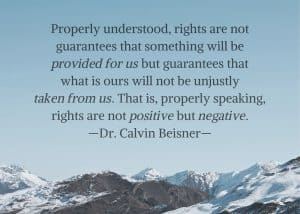 Ask participants to recall this quote from Dr. Calvin Beisner: “Properly understood, rights are not guarantees that something will be provided for us but guarantees that what is ours will not be unjustly taken from us.That is, properly speaking, rights are not positive but negative.” A PDF file of this graphic is available here.
Ask participants to recall this quote from Dr. Calvin Beisner: “Properly understood, rights are not guarantees that something will be provided for us but guarantees that what is ours will not be unjustly taken from us.That is, properly speaking, rights are not positive but negative.” A PDF file of this graphic is available here.- Say: We are ready now to begin considering Principle 7: Rights are inextricably linked to God’s laws.
- Point out that we see evidence of this principle in the Declaration where the Founders spoke of “the Laws of Nature and of Nature’s God,” and then went on to write that “We hold these truths to be self-evident, that all men are created equal, that they are endowed by their Creator with certain unalienable Rights, that among these are Life, Liberty and the pursuit of Happiness. — That to secure these rights, Governments are instituted among Men, deriving their just powers from the consent of the governed….”
 Yet we also see evidence of this truth in the Ten Commandments themselves. As we said last time, the Decalogue, or the Ten Commandments, isn’t just a list of moral responsibilities or obligations, as important as this is. It also is a list upholding negative rights. A PDF file of the above graphic is available here.
Yet we also see evidence of this truth in the Ten Commandments themselves. As we said last time, the Decalogue, or the Ten Commandments, isn’t just a list of moral responsibilities or obligations, as important as this is. It also is a list upholding negative rights. A PDF file of the above graphic is available here.- Let’s examine that assertion more closely. Distribute “An Easy Exercise” to each participant, and give participants time to respond on their own to the instructions given.
- After an appropriate amount of time has passed, discuss how each of the Ten Commandments upholds a negative right. Although there may be room for slight variance in answers given, here is an answer guide to “An Easy Exercise.”
- Explain that item E in the right column could have included the word freely: Had freely been included, the phrase would have read, “The right to worship God freely.” Including it makes sense because the focus of the list is on negative rights, which means rights practiced without hindrance from government or other people. At the same time, we can affirm that in Commandments 1, 2, 3, and 4, God gives guidelines for approaching Him and worshiping Him. The responsibility to follow these, however, belongs to the worshiper. From a negative rights perspective, as long as he or she isn’t violating others rights, an individual has a right to worship God as he or she sees fit.
- Also point out that in item F in the right column, the right listed is “The right to work and accumulate wealth.” Say: Hopefully, as you have read the articles assigned to you over the last three weeks, you’ve seen that the Fourth Commandment explicitly upholds the right to work—and that it also implicitly upholds the right to accumulate wealth.
 Explain that increasingly, Americans are buying into the lie that capitalism promotes greed and selfishness. The truth, though, is that if the free market is allowed to operate as it should, it actually affords individuals the opportunity to take appropriate personal responsibility for their own affairs while making others’ lives better. Part 2 of the series on the free enterprise economic model affirms, “Working for profit…isn’t inherently wrong. Working to benefit oneself isn’t necessarily a manifestation of greed. It can represent, and usually does, accepting the mantle of responsibility, acting so as not to have to rely on society or other individuals for basic needs.…[Moreover, t]he beauty of a free enterprise economy is that when the worker, the supervisor, the manager, the entrepreneur, and the CEO voluntarily do their jobs well, they’re not the only ones who benefit. Others—people who use their company’s services and/or products—benefit as well. None of this activity is disruptive, nor is any of it forced. And all of it contributes to order, stability, and progress in society.” A PDF file of this graphic is available here.
Explain that increasingly, Americans are buying into the lie that capitalism promotes greed and selfishness. The truth, though, is that if the free market is allowed to operate as it should, it actually affords individuals the opportunity to take appropriate personal responsibility for their own affairs while making others’ lives better. Part 2 of the series on the free enterprise economic model affirms, “Working for profit…isn’t inherently wrong. Working to benefit oneself isn’t necessarily a manifestation of greed. It can represent, and usually does, accepting the mantle of responsibility, acting so as not to have to rely on society or other individuals for basic needs.…[Moreover, t]he beauty of a free enterprise economy is that when the worker, the supervisor, the manager, the entrepreneur, and the CEO voluntarily do their jobs well, they’re not the only ones who benefit. Others—people who use their company’s services and/or products—benefit as well. None of this activity is disruptive, nor is any of it forced. And all of it contributes to order, stability, and progress in society.” A PDF file of this graphic is available here. Law and liberty go together. In fact, a nation cannot have liberty without a respect for law. Yet the laws upheld must respect individual freedom and sovereignty, and seek to prevent citizens from violating others’ rights. A PDF file of this graphic is available here.
Law and liberty go together. In fact, a nation cannot have liberty without a respect for law. Yet the laws upheld must respect individual freedom and sovereignty, and seek to prevent citizens from violating others’ rights. A PDF file of this graphic is available here.- Ask: Can’t you see now the truth of Principle 7—that “[r]ights are inextricably linked to God’s laws”? Thankfully, the Founders saw the connection, understood it, and upheld it. While it’s true they may not have explained their perspective in the same way we have here, this doesn’t matter. What matters is that they understood a connection we have failed to “get.” I believe one of the most important factors in recovering American liberty is for churches to rediscover this link, teach it, and uphold it consistently.
- Indicate you’re now moving on to Principle 8: Government does not grant rights but has the responsibility to recognize, maintain, and protect them.
- Explain that government has, in recent times, strongly violated its responsibility to protect inherent rights. Explain that one of the ways you’d like to drive this point home is by showing how government has jettisoned its constitutional job, and how the decisions of government infringe on people’s rights. While a large number of number of recent examples of government’s violating inherent, God-given rights exist and have occurred against the backdrop of the coronavirus pandemic, in a great many of these cases people are working hard to implement reasonable social distance guidelines to prevent the spread of the disease. Item 20 provides a great example of this.
- If desired, either present a summary to the large group, or ask the individual you’ve enlisted to present a summary, of the events described here. These events also are showcased here.
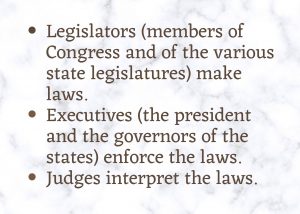 Say: American government has been designed to be a limited government. We’ll talk more about this next week. The Founders fashioned it to be limited in part by separating it into three separate branches—legislative, executive, and judicial. Legislators (members of Congress and various state legislatures) make laws; executives (the president and the governors of the states) enforce the laws; and judges interpret the laws. Here is a summary of the roles of these branches of government at the federal level. A PDF file of the above graphic is available here.
Say: American government has been designed to be a limited government. We’ll talk more about this next week. The Founders fashioned it to be limited in part by separating it into three separate branches—legislative, executive, and judicial. Legislators (members of Congress and various state legislatures) make laws; executives (the president and the governors of the states) enforce the laws; and judges interpret the laws. Here is a summary of the roles of these branches of government at the federal level. A PDF file of the above graphic is available here. Point out that neither the Supreme Court of the United States, nor any other court, has the task of making laws. Against this backdrop, consider that in numerous times in the past, the Supreme Court has gotten it wrong—very wrong. These cases include, but are not limited to, these: Dred Scott in 1857, Buck v. Bell in 1927, and Roe v. Wade and Doe v. Bolton in 1973. A PDF file of the accompanying graphic is available here.
Point out that neither the Supreme Court of the United States, nor any other court, has the task of making laws. Against this backdrop, consider that in numerous times in the past, the Supreme Court has gotten it wrong—very wrong. These cases include, but are not limited to, these: Dred Scott in 1857, Buck v. Bell in 1927, and Roe v. Wade and Doe v. Bolton in 1973. A PDF file of the accompanying graphic is available here.- Of all the rulings that the court has handed down, the ruling that altered the definition of marriage to include same-sex couples can be considered the most egregious of all, even though the decisions on abortion would be close.
- Point out that the court’s ruling regarding marriage is ominous for many reasons and from many vantage points, but here we are going to look at it briefly from a “rights” perspective. We have affirmed in this series of studies that the Declaration of Independence essentially says that people establish governments to protect their rights—but not just whatever people might say are their rights. The rights governments are established to protect are endowed, or given by God to all people by virtue of His having created them in His image. The Declaration affirms these truths on the heels of having mentioned “the Laws of Nature and of Nature’s God.” All of these concepts reflect biblical ideals.
- Assure participants that what you are going to say, you’re going to say in love, but you’re going to speak truthfully too. Point out that speech that avoids the truth is not loving. Say: With respect to all, I believe it is time to ask important questions like these: Can you think of anything that violates “the Laws of Nature and of Nature’s God” more thoroughly than same-sex marriage? Yet we have it nationwide because of a Supreme Court ruling handed down on June 26, 2015. The case and the ruling are called Obergefell. Can you think of a right that is more natural or inherent than the right of a newborn child to have both a mother and a father? Say: In Obergefell, the government didn’t just fail to protect that basic human right. Instead, it thoroughly trashed it.
- Say: It isn’t popular today to say that homosexuality is not on par with heterosexuality, but it is not. Homosexuality is a violation of “the Laws of Nature and of Nature’s God.” If time allows, review and briefly discuss Romans 1:18-32. Also read or mention 1 Corinthians 6:9-11. Even tough homosexuality is a serious sin—and clearly fornication, idolatry, adultery, effeminacy [NASB], stealing, coveting, drunkenness, revelry, and extortion also are serious sins (see 1 Cor. 6:9-10)—we must never assume homosexuals are beyond God’s saving reach. If you’re unable to read and discuss these passages because of a lack of time, mention the references and encourage participants to study the passages during the coming week.
 In Obergefell, Justice Clarence Thomas offered a brilliant dissent. Here is his first paragraph. “The Court’s decision today is at odds not only with the Constitution, but with the principles upon which our Nation was built. Since well before 1787 [the year the Constitution was drafted], liberty has been understood as freedom from government action, not entitlement to government benefits. The Framers created our Constitution to preserve that understanding of liberty. Yet the majority invokes our Constitution in the name of a ‘liberty’ that the Framers would not have recognized, to the detriment of the liberty they sought to protect. Along the way, it rejects the idea—captured in our Declaration of Independence—that human dignity is innate and suggests instead that it comes from the Government. This distortion of our Constitution not only ignores the text, it inverts the relationship between the individual and the state in our Republic. I cannot agree with it.” A PDF file of the above graphic is available here.
In Obergefell, Justice Clarence Thomas offered a brilliant dissent. Here is his first paragraph. “The Court’s decision today is at odds not only with the Constitution, but with the principles upon which our Nation was built. Since well before 1787 [the year the Constitution was drafted], liberty has been understood as freedom from government action, not entitlement to government benefits. The Framers created our Constitution to preserve that understanding of liberty. Yet the majority invokes our Constitution in the name of a ‘liberty’ that the Framers would not have recognized, to the detriment of the liberty they sought to protect. Along the way, it rejects the idea—captured in our Declaration of Independence—that human dignity is innate and suggests instead that it comes from the Government. This distortion of our Constitution not only ignores the text, it inverts the relationship between the individual and the state in our Republic. I cannot agree with it.” A PDF file of the above graphic is available here.- Using the above graphic, read each statement to the members of your group. Consider and briefly discuss each one in light of the Founders’ perspective on rights. Invite participants to share their thoughts.
- Let’s review: Remind participants that you’ve been exploring items 7 and 8 on the 10-item list. These are as follows: • 7) Rights are inextricably linked to God’s laws. • 8) Government does not grant rights but has the responsibility to recognize, maintain, and protect them.
- State that even though our nation was founded on the principle that government has the responsibility to protect unalienable rights, it clearly is violating that principle in defiance of the Declaration of Independence, the US Constitution, and God Himself.
- How should we respond? Encourage participants that you will explore that question in the next session.
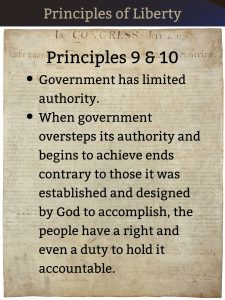 Looking Ahead: Remind the members of your group that the next session will be the final session, although continued study is encouraged. In the session you will consider Principles 9 and 10. The overarching theme of the session will be that government is accountable to God.
Looking Ahead: Remind the members of your group that the next session will be the final session, although continued study is encouraged. In the session you will consider Principles 9 and 10. The overarching theme of the session will be that government is accountable to God.
-
-
- Government has limited authority.
- When government oversteps its authority and begins to achieve ends contrary to those it was established and designed by God to accomplish, the people have a right and even a duty to hold it accountable.
-
A PDF file of this graphic is available here.
Assignments: (For your convenience, reproduce this page and give it to each member of your group.)
-
-
- Remind your class members to read and study Romans 1:18-32 and 1 Corinthians 6:9-11.
- Share with them that this brief article also may be helpful. It’s titled “Why Homosexuality Is Unique Among Sins and the Consequences of God’s Letting Go.”
- Finally, ask your class members to read one more article. They can link to it from the Word Foundations website. It is listed in the same menu with the titles of the other articles they’ve read, just above them. The title of the article is “Recapture the Spirit of ’76.”
- Encourage participants just before they leave with these words from Alexander Hamilton:
-
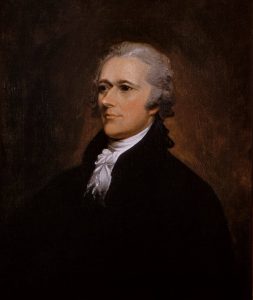
The fundamental source of all your errors, sophisms, and false reasoning, is a total ignorance of the natural rights of mankind. Were you once to become acquainted with these, you could never entertain a thought, that all men are not, by nature, entitled to a parity of privileges. You would be convinced, that natural liberty is a gift of the beneficent Creator, to the whole human race; and that civil liberty is founded in that; and cannot be wrested from any people, without the most manifest violation of justice.”
Thank your class members for their involvement. Close in prayer. Ask the Lord to bring America back to its founding principles, especially a recognition that a respect for Him and His Laws is necessary for liberty, stability, and prosperity.
Copyright © 2020 by B. Nathaniel Sullivan. All rights reserved.
Unless otherwise indicated, Scripture has been taken from the New King James Version®. Copyright © 1982 by Thomas Nelson, Inc. Used by permission. All rights reserved.
NASB refers to the NEW AMERICAN STANDARD BIBLE®, Copyright © 1960, 1962, 1963, 1968, 1971, 1972, 1973, 1975, 1977, 1995 by The Lockman Foundation. Used by permission.
Permission is granted to reproduce this material specifically for the educational purposes for which it has been designed.
top image credit: South facade of Independence Hall (formerly the Pennsylvania Statehouse), Philadelphia, principal meeting site of the Second Continental Congress
